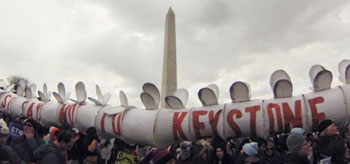The State Department has completed its second environmental assessment of the TransCanada XL tar sands pipeline, with results no better than the first time around.
It basically concludes that since tar sands production will continue with or without the pipeline, the pipeline doesn’t pose a problem.
"You know the news is bad when it comes out at 4pm on Friday," notes Michael Brune, executive director of Sierra Club.
"We’re mystified as to how the State Department can acknowledge the negative effects of the Earth’s dirtiest oil on our climate, but at the same time claim that the proposed pipeline will ‘not likely result in significant adverse environmental effects.’ Whether this failure was willful or accidental, this report is nothing short of malpractice," says Brune.
The review supposedly examined the environmental impact of building the pipeline, potential ruptures and spills, and its effect on climate change.
It says that approving or rejecting the pipeline wouldn’t have a significant effect on whether Canada expands tar sands development:
Based on information and analysis about the North American crude transport infrastructure (particularly the proven ability of rail to transport substantial quantities of crude oil profitably under current market conditions, and to add capacity relatively rapidly) and the global crude oil market, the draft Supplemental EIS concludes that approval or denial of the proposed Project is unlikely to have a substantial impact on the rate of development in the oil sands, or on the amount of heavy crude oil refined in the Gulf Coast area.
But that’s not true. It’s widely known that Canada desperately wants the pipeline because it will allow it to expand further tar sands production.
"Tar sands does not expand unless Keystone XL is built," says Jane Kleeb of Bold Nebraska. "The State Department’s assumption that tar sands development does not change with or without this pipeline is wrong and laughable. Why would TransCanada spend billions on building the pipeline and millions on lobbying unless this piece of infrastructure is the lynchpin for the expansion of tar sands. Without this pipeline Canada stays at 2 million barrels a day, with it they get 3 million barrels a day. The President has the ability to keep a million barrels of tar sands in the ground a day. With a stroke of a pen he can protect property rights, water and make a dent in climate change."
It’s even worse than that. Exports will hit 6.2 million barrels a day by 2030, according to the Canadian Association of Petroleum Producers. Without the pipeline, tar sands production is estimated to fall flat by 2020.

80% of all known petroleum reserves must remain in the ground to have any hope of averting an average global temperature rise above two degrees Celsius, wrote Bill McKibben in the Rolling Stone.
And James Hansen, leading NASA climate has said over and over again, "If Canada proceeds, and we do nothing, it will be game over for the climate. We need to start reducing emissions significantly, not create new ways to increase them."
And what about potential pipeline ruptures and spills? TransCanada and Enbridge have terrible records on that. One example is the devastating spill in Michigan’s Kalamazoo River. The State Dept says, "Spills associated with the proposed Project that enter the environment are expected to be rare and relatively small."
Enbridge refuses to pay for a study that would examine the on-going impacts of the Kalamazoo spill.
"Oil spills, environmental damage, wildlife put in harm’s way, a doubling-down on the climate crisis: It’s hard to understand why the Obama government is even considering this project," says Bill Snape, attorney for the Center for Biological Diversity.
Although the oil industry continues to mislead the public over the number of jobs that will be created to build the pipeline. Their estimate of "tens of thousands" of jobs is wildly over the top – it’s expected to create just 2000 tempory jobs and 35-50 permanent jobs and negligible revenues for the US.
The US won’t see a cent of money from the oil or taxes because the Gulf refineries are in a Foreign Trade Zone. In fact, most experts see oil prices rising from the pipeline. The huge expansion of natural gas fracking in the US has already reduced the need for imports.
Read why Canada thinks they have an ace in the hole.
The EU’s commissioner for Climate Change, Connie Hedegaard told reporters, "if the Obama administration rejects the proposed Keystone XL pipeline, it would send a strong message that the US is serious about combating climate change."
Once the Draft SEIS has been published by the EPA, the public will have 45 days to comment. After that, the State Dept will issue the final environmental assessment. Give your comment by emailing:

